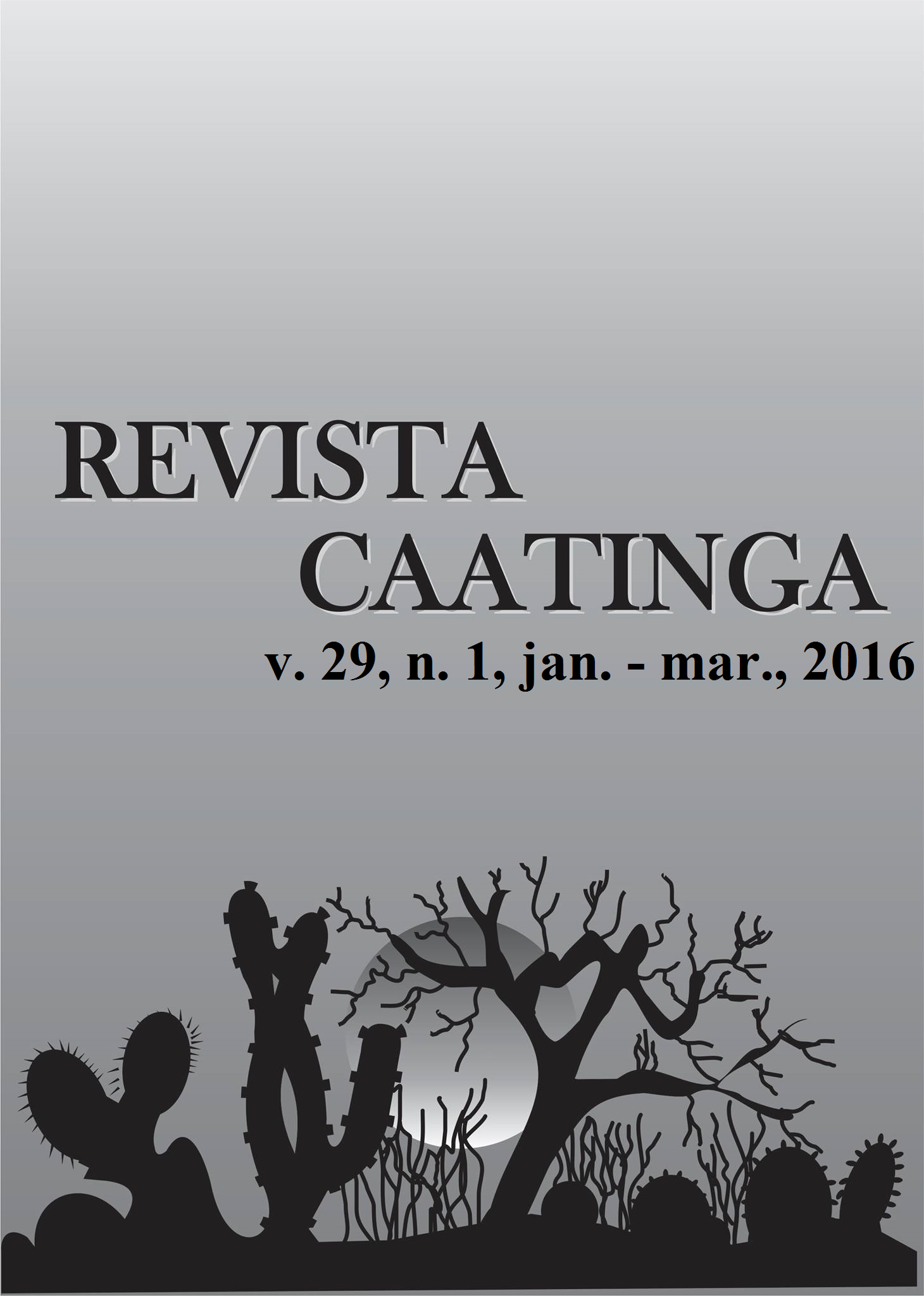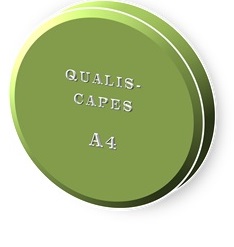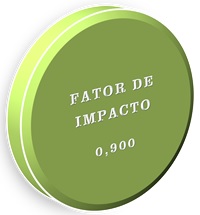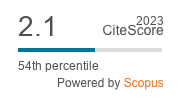TEORES DE NUTRIENTES EM GIRASSOL IRRIGADO COM ÁGUA DA INDÚSTRIA DE PETRÓLEO
DOI:
https://doi.org/10.1590/1983-21252016v29n111rcPalavras-chave:
Água residuária. Salinidade. Água produzida. Disponibilidade de nutrientes.Resumo
Irrigação com água produzida, que é gerada durante a extração de petróleo bruto e gás pode ser uma opção para agricultura irrigada em regiões semi-áridas mas o efeito desta água tratada no estado nutricional das plantas e no crescimento e desenvolvimento das culturas deve ser avaliado. Com esse propósito, determinamos alterações nos aspectos nutricionais da cultura de girassol irrigado com água produzida e os efeitos na produção de biomassa e de grãos de girassol. O girassol cv. BRS 321 foi cultivado durante três ciclos em áreas irrigadas com água produzida filtrada (FPW) e tratada por osmose (OPW) e água subterrânea (GW). Ao final de cada ciclo, raízes, parte aérea e grãos foram coletados para determinar as concentrações de nutrientes. Irrigação com água produzida afetou o acúmulo de nutrientes em plantas de girassol. Irrigação com OPW promoveu acúmulo de Ca, Na, N, P e Mg. Plantas irrigadas com FPW acumularam maiores teores de Na em raízes e parte aérea, e afetou negativamente a produção de biomassa e de grãos de girassol. Os níveis de Na na parte aérea de plantas irrigadas com FPW aumentaram ao longo dos três ciclos de cultivo. Sob condições controladas, é possível reutilizar a água produzida tratada por osmose inversa na agricultura, mas necessita de mais estudos a longo prazo para compreender o efeito cumulativo, nas propriedades químicas e biológicas do solo e na produção das culturas. Estes resultados sugerem que a irrigação com água produzida tratada adequadamente, é uma boa estratégia para a sustentabilidade dos recursos hídricos.Downloads
Referências
BEDBABIS, S. et al. Effect of irrigation with treated wastewater on soil chemical properties and infiltration rate. Journal of Environmental Management, Florida, v. 133, n. 2, p. 45-50, 2014.
CHATZAKIS, M. K. et al. Irrigation of castor bean (Ricinus communis L.) and sunflower (Helianthus annuus L.) plant species with municipal wastewater effluent: impacts on soil properties and seed yield. Water, Basel, v. 3, n. 4, p. 1112-1127, 2011.
CIRELLI, G. L. et al. Treated municipal wastewater reuse in vegetable production. Agricultural Water Management, Netherlands, v. 104, n. 2, p. 163-170, 2012.
FRENKEN, K.; KIERSCH, B. 2011. Monitoring agricultural water use at country level: Experiences of a pilot project in Benin and Ethiopia. FAO - FOOD AND AGRICULTURE ORGANIZATION OF THE UNITED NATIONS: Land and Water Division. Land And Water Discussion Paper, 9. Disponível em: www.fao.org/nr/water/docs/FAO. Acesso em: 20 Jan. 2015.
GENGMAO, Z.; MEHTA, S. K.; ZHAOPU, L. Use of saline aquaculture wastewater to irrigate salt-tolerant Jerusalem artichoke and sunflower in semiarid coastal zones of China. Agricultural Water Management, Netherlands, v. 97, n. 12, p. 1987-1993, 2010.
HEIDARPOUR, M. et al. The effects of treated wastewater on soil chemical properties using subsurface and surface irrigation methods. Agricultural Water Management, Netherlands, v. 90, n. 1, p. 87-94, 2007.
KAMALULDEENA, J. et al. Uptake and distribution of ions reveal contrasting tolerancemechanisms for soil and water salinity in okra (Abelmoschus esculentus) and tomato (Solanum esculentum). Agricultural Water Management, Netherlands, v. 146, n. 7, p. 95-104, 2014.
KHAJANCHI -LAL, P. S.; MINHAS, P. S.; YADAV, R. K. Long-term impact of wastewater irrigation and nutrient rates II. Nutrient balance, nitrate leaching and soil properties under peri-urban cropping systems. Agricultural Water Management, Netherlands, v. 156, n. 6, p. 110-117, 2015.
KIZILOGLU, F. M. et al. Effects of untreated and treated wastewater irrigation on some chemical properties of cauliflower (Brassica olerecea L. var. botrytis) and red cabbage (Brassica olerecea L. var. rubra) grown on calcareous soil in Turkey. Agricultural Water Management, Netherlands, v. 95, n. 6, p. 716-724, 2008.
LIU, J.; GUO, W. Q.; SHI, D. C. Seed germination, seedling survival, and physiological response of sunflowers under saline and alkaline conditions. Photosynthetica, Lysolage, v. 48, n. 2, p. 278-286, 2010.
MELO, M. et al. Advanced performance evaluation of a reverse osmosis treatment for oilfield produced water aiming reuse. Desalination, Amsterdam, v. 250, n. 3, p. 1016-1018, 2010.
MORUGÁN-CORONADO, A. et al. Short-term effects of treated wastewater irrigation on Mediterranean calcareous soil. Soil & Tillage Research, Netherlands, n. 1, v. 112, p. 18-26, 2011.
NASCIMENTO, J. F. et al. Tratamento de águas de produção para uso em irrigação. Rio de Janeiro: CENPS/PDP/TPAP, 2006. 57 p. (Relatório técnico interno, 18).
PEREIRA, B. F. F. et al. Reclaimed wastewater: Impact on soil–plant system under tropical conditions. Journal of Hazardous Materials, Netherlands, v. 192, n. 1, p. 54-61, 2011.
R CORE TEAM. R: A Language and Environment for Statistical Computing. Organização: R Foundation for Statistical Computing. Vienna, Austria. 2013. Disponível em: http://www.R-project.org. Acesso em: Jan. 2014.
RODDA, N. et al. Use of domestic greywater for small-scale irrigation of food crops: Effects on plants and soil. Physics and Chemistry of the Earth, United Kingdom, v. 36, n. 14, p. 1051-1062, 2011.
RUSAN, M. J. M.; HINNAWI, S.; ROUSAN, L. Long term effect of wastewater irrigation of forage crops on soil and plant quality parameters. Desalination, Amsterdam, v. 215, n. 1, p. 143-152, 2007.
SHAHBAZ, M. et al. Salt-induced modulation in growth, photosynthetic capacity, proline content and ion accumulation in sunflower (Helianthus annuus L.). Acta Physiologiae Plantarum, Poland, v. 33, n. 4, p. 1113-1122, 2011.
SHAHEEN, S. et al. Salt stress affects water relations, photosynthesis, and oxidative defense mechanisms in Solanum melongena L. Journal of Plant Interactions, United Kingdom, v. 8, n. 1, p. 85-96, 2013.
SILVA, F. C. Manual de análises químicas de solos, plantas e fertilizantes. 2. ed. Brasília, DF: EMBRAPA, 2009. 627 p.
SINGH, P. K. et al. Effects of sewage wastewater irrigation on soil properties, crop yield and environment. Agricultural Water Management, Netherlands, v. 103, n. 1, p. 100-104, 2012.
SOU/DAKOURÉ, M. Y. et al. Impacts of irrigation with industrial treated wastewater on soil properties. Geoderma, Netherlands, v. 201, n. 6, p. 31-39, 2013.
XU, J. et al. Impact of long-term reclaimed wastewater irrigation on agricultural soils: A preliminary assessment. Journal of Hazardous Materials, Netherlands, v. 183, n. 1. p. 780-786, 2010.
Downloads
Publicado
Edição
Seção
Licença
Os Autores que publicam na Revista Caatinga concordam com os seguintes termos:
a) Os Autores mantêm os direitos autorais e concedem à revista o direito de primeira publicação, com o trabalho simultaneamente licenciado sob a Licença Creative Commons do tipo atribuição CC-BY, para todo o conteúdo do periódico, exceto onde estiver identificado, que permite o compartilhamento do trabalho com reconhecimento da autoria e publicação inicial nesta revista, sem fins comerciais.
b) Os Autores têm autorização para distribuição não-exclusiva da versão do trabalho publicada nesta revista (ex.: publicar em repositório institucional ou como capítulo de livro), com reconhecimento de autoria e publicação inicial nesta revista.
c) Os Autores têm permissão e são estimulados a publicar e distribuir seu trabalho online (ex.: em repositórios institucionais ou na sua página pessoal) a qualquer ponto antes ou durante o processo editorial, já que isso pode gerar alterações produtivas, bem como aumentar o impacto e a citação do trabalho publicado (Veja O Efeito do Acesso Livre).







